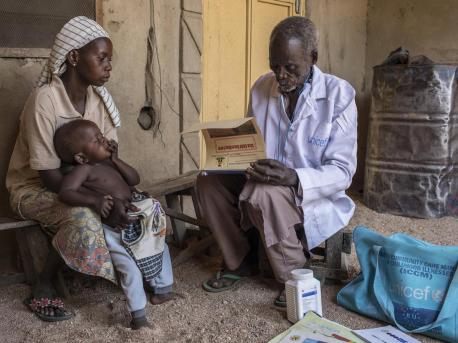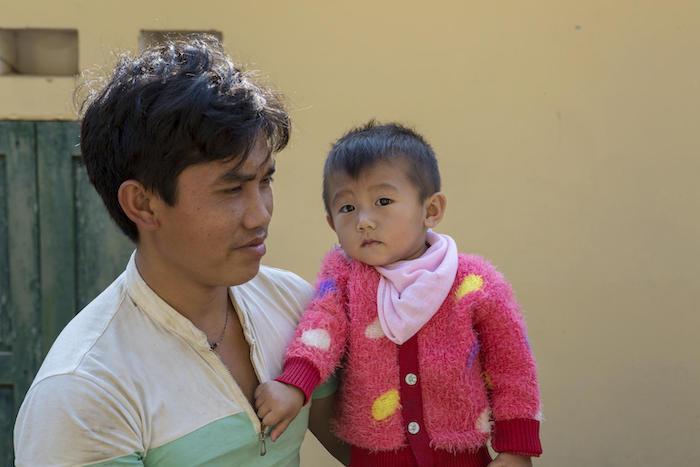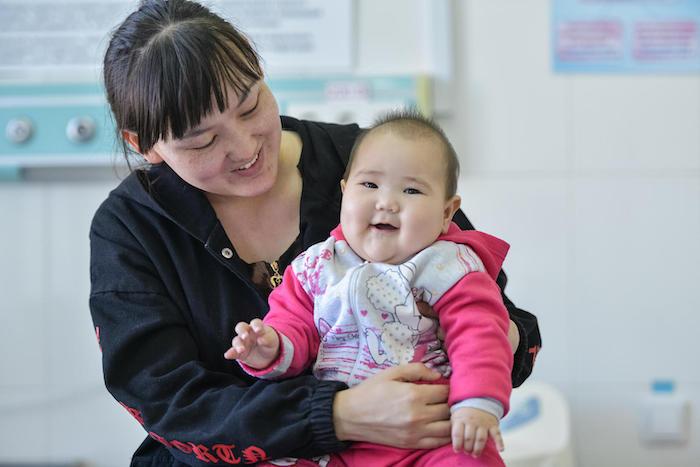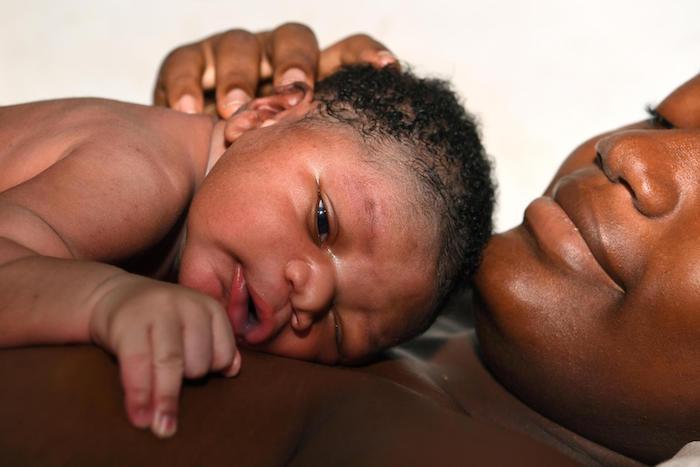
Fighting for Breath: The Battle to Save Kids From Pneumonia
Every 39 seconds, a child under 5 dies from pneumonia. Urgent action is needed to end this "forgotten" epidemic.
Last year alone, more than 800,000 children under 5 died from pneumonia — a vaccine-preventable lung infection. Most of them would still be alive today if they had received quality health care.
The key to saving children's lives? Investing in the training of more health workers and supplying them with the tools they need to properly diagnose, treat and prevent pneumonia, the world's single biggest killer of children.

Giang Thi Thuy Linh waits for a well-child visit with her dad, Giang A Sinh, at Hua Ngai commune health center in Dien Bien, Vietnam on March 4, 2019. She was successfully treated for pneumonia at the district hospital. © UNICEF/UN0287933/Viet Hung
Investing in training and tools for health workers could avert nearly 9 million child deaths from pneumonia in the next decade
On January 29-31, delegations from 24 countries are meeting in Barcelona for the Global Forum on Childhood Pneumonia, the world's first conference on this "forgotten" epidemic. Pneumonia is easily preventable by vaccines and readily treatable with $1 antibiotics. Yet tens of millions of children are unvaccinated — and one in three children with symptoms do not get the treatment they need.
"If we are serious about saving the lives of children, we have to get serious about fighting pneumonia," said UNICEF Executive Director Henrietta Fore. "As the current coronavirus outbreak shows, this means improving timely detection and prevention. It means making the right diagnosis and prescribing the right treatment. It also means addressing the major causes of pneumonia deaths like malnutrition, lack of access to vaccines and antibiotics and tackling the more difficult challenge of air pollution."

Seven-month-old Aisezim smiles on her mother's lap after being treated for pneumonia in the emergency room of a clinic in Turkestan, Kazakhstan on March 13, 2019. Last year, UNICEF partnered with health administrators in Turkestan to open a resource center where thousands of nurses, doctors and social workers receive training.© UNICEF/UNI220724/Kaliyev
UNICEF sent 6 metric tons of respiratory masks and protective suits for health workers to support China's response to the coronavirus outbreak
On January 30, the World Health Organization declared the coronavirus (2019-nCoV) outbreak a global public health emergency. Cases have been reported in 18 countries since the outbreak began in December in the Chinese city of Wuhan. In more severe cases, infection can cause pneumonia; older people with existing chronic conditions seem to be more at risk.
The virus is resistant to antibiotics, and it will be at least a year before a vaccine is developed. In response to a severe shortage of medical supplies, a UNICEF shipment of 6 metric tons of respiratory masks and protective suits for health workers arrived in Shanghai on January 29. More shipments will follow in the coming days and weeks.
"The coronavirus is spreading at breakneck speed, and it is important to put all the necessary resources into halting it," said Fore. "We may not know enough about the virus's impact on children or how many may be affected — but we do know that close monitoring and prevention is key. Time is not on our side."
Wisdom was born four months ago in Nigeria, where more children die from pneumonia than in any other country. But today, he is getting vaccinated - an easy and affordable way of preventing the deadly disease. Every child has a right to the same protection.#StopPneumoniapic.twitter.com/LEdY3ftANn
— UNICEF (@UNICEF) January 29, 2020
Child deaths from pneumonia are concentrated in the world's poorest countries
Meanwhile, participants at the Global Pneumonia Forum — co-hosted by UNICEF — are mapping out a strategy to protect the world's children from pneumonia. Children growing up in poverty are most at risk. Just five countries account for more than half of all child pneumonia deaths: Nigeria, India, Pakistan, the Democratic Republic of Congo and Ethiopia.
UNICEF makes pneumonia vaccines available to protect children and provides critical health care services to children who need them most in conflict areas and humanitarian disasters. According to researchers at Johns Hopkins University, scaling up health interventions aimed at reducing pneumonia cases — providing vaccines and antibiotics, training health workers, boosting breastfeeding rates and improving nutrition — will create a ripple effect that would also prevent millions of child deaths from other major childhood illnesses like diarrhea, sepsis and measles.

Aicha's baby boy was born healthy on January 1, 2019 at the UNICEF-supported Hospital of Port Bouet, a suburb of Abidjan, the capital of Côte d'Ivoire. Most newborns who do not survive die from preventable causes such as pneumonia and sepsis. © UNICEF/UN0269314/Dejongh
Outdoor air pollution contributes to nearly 1 in 5 childhood deaths from pneumonia worldwide
Another key to fighting childhood pneumonia: reducing air pollution to protect the lungs and brain tissue of approximately 300 million children growing up breathing toxic air. Outdoor pollution contributes to 17.5 percent — nearly one in five — pneumonia deaths among children worldwide, and household pollution from the indoor use of solid cooking fuels contributes to an additional 29 percent of child deaths.
UNICEF is calling on world leaders to take urgent steps to make the air fit for children to breathe, including cutting back on fossil fuel combustion, investing in renewable sources of energy and developing better waste management to prevent open burning of harmful chemicals.
Top photo: On January 13, 2020, Loveleen Anex, 25, holds her 9-month-old daughter, Ensteen, as Community Oriented Resource Person (CORP) and health worker Benjamin Daniels, 66, does a general pediatric health check, including examining for possible signs of pneumonia, in the village of Jarede, Adamawa state, northeastern Nigeria. © UNICEF/UNI279445/Modola


